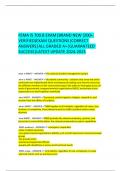FEMA IS 700.B EXAM|BRAND NEW (200+
VERIFIED)EXAM QUESTIONS|CORRECT
ANSWERS|ALL GRADED A+|GUARANTEED
SUCCESS|LATEST UPDATE 2024-2025
what is NIMS? - ANSWER-✅the national incident management system
who is NIMS? - ANSWER-✅the whole community - solutions that serve the entire
community are implemented while simultaneously making sure that the resources
the different members of the community bring to the table are leveraged across all
levels of government, nongovernmental organizations (NGO), and private sector
organizations to work together seamlessly
why NIMS? - ANSWER-✅to prevent, protect against, mitigate, respond to, and
recover from the effects of incidents
when NIMS? - ANSWER-✅NIMS applies to all incidents, regardless of cause, size,
location, or complexity, from planned events to traffic accidents and to major
disasters
how NIMS? - ANSWER-✅NIMS provides the shared vocabulary, systems, and
processes to successfully deliver the national preparedness system capabilities
NIMS audience - ANSWER-✅-emergency responders
-other incident personnel
-non-governmental organizations (NGOs) such as faith-based and community-based
groups
-the private sector
-elected and appointed officials
-people with disabilities or access and functional needs
NIMS scope - ANSWER-✅-all incidents, regardless of size, complexity or scope
-planned events such as sporting events
, NIMS is - ANSWER-✅-a comprehensive, nationwide, systematic approach to
incident management, including the command and coordination of incidents,
resource management, and information management
-a set of concepts and principles for all threats, hazards, and events across all mission
areas (prevention, protection, mitigation, response, recovery)
-scalable, flexible, and adaptable; used for all incidents, from day-to-day to large-
scale
-standard resource management procedures that enable coordination among
different jurisdictions or organizations
-essential principles for communications and information management
NIMS is not - ANSWER-✅-the only incident command system
-only applicable to certain emergency/incident response personnel
-a static system
-a response plan
-used only during large-scale incidents
-a resource ordering system
-a communications plan
incident mangement - ANSWER-✅the application of resources by organizations to
plan for, respond to, and recover from an incident
priorities for incident management in planning, response, and recovery efforts
include - ANSWER-✅-saving lives
-stabilizing the incident
-protecting property and the environment
NIMS guiding principles - ANSWER-✅-flexibility
-standardization
-unity of effort
flexibility - ANSWER-✅enables NIMS to be applicable to incidents that vary widely in
terms of hazard, geography, demographics, culture, cultural, and organizational
authorities
standard organizational structures - ANSWER-✅improve integration and
connectivity among organizations
standard practices - ANSWER-✅that allow incident personnel and organizations to
work together effectively
common terminology - ANSWER-✅enables effective communication
unity of effort - ANSWER-✅coordinating activities among various organizational
representatives to achieve common objectives, enables organizations with
, jurisdictional authority or functional responsibilities to support each other while
allowing each participating agency to maintain its own authority and accountability
major components of NIMS - ANSWER-✅-resource management
-command and coordination
-communications and information management
resource management - ANSWER-✅describes standard mechanisms to
systematically manage resources, including personnel, equipment, supplies, teams
and facilities, both before and during incidents in order to allow organizations to
more effectively share resources when needed
command and coordination - ANSWER-✅describes leadership roles, processes, and
recommended organizational structures for incident management at the operational
and incident support levels and explains how these structures interact to manage
incidents effectively and efficiently
communications and information management - ANSWER-✅describes systems and
methods that help to ensure that the incident personnel and other decision makers
have the means and information they need to make and communicate decisions
resource management key activities - ANSWER-✅-identifying and typing resources
-qualifying, certifying and credentialing personnel
-planning for resources
-acquiring, storing, and inventorying resources
resource typing - ANSWER-✅establishes common definitions for capabilities of
personnel, equipment, teams, supplies, and facilities
capability - ANSWER-✅the resource's capability to perform its function in one or
more of the five mission areas
five mission areas - ANSWER-✅-prevention
-protection
-mitigation
-response
-recovery
category - ANSWER-✅the function for which a resource would be most useful (e.g.,
firefighting, law enforcement, health and medical)
kind - ANSWER-✅a broad characterization, such as personnel, equipment, teams
and facilities
type - ANSWER-✅a resource's level of capability to perform its function based on
size, power, capacity (for equipment), or experience and qualifications; type 1 has
greater capacity than type 2, 3 or 4





